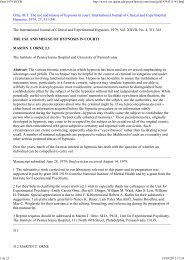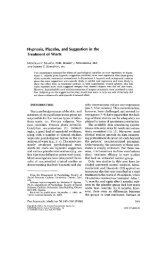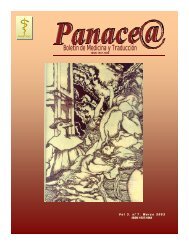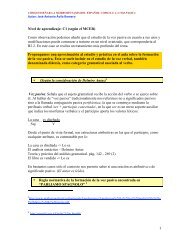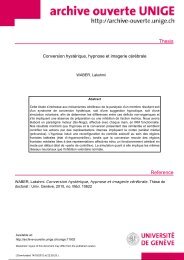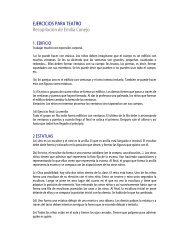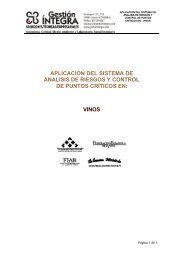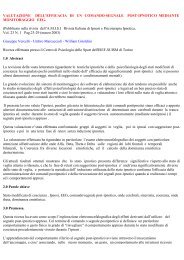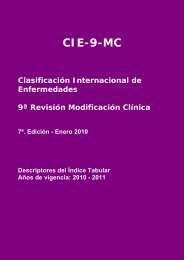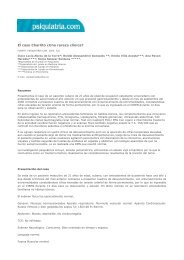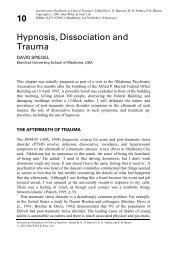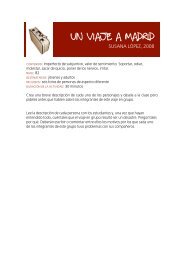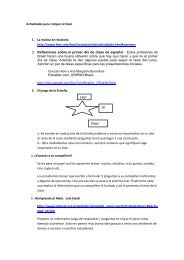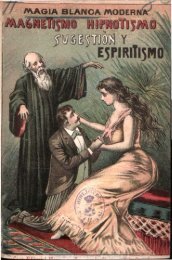Diccionario etimológico comparado de la lengua castellana
Diccionario etimológico comparado de la lengua castellana
Diccionario etimológico comparado de la lengua castellana
Create successful ePaper yourself
Turn your PDF publications into a flip-book with our unique Google optimized e-Paper software.
2632 FÓCUL FOGÓN<br />
3. fig. Lugar real ó imaginario en que esta<br />
como reconcentrada alguna cosa con toda su<br />
fuerza y eficacia, y <strong>de</strong>s<strong>de</strong> el cual se propaga<br />
ó ejerce influencia. Tómase generalmente en<br />
ma<strong>la</strong> parte, foco <strong>de</strong> corrupción, do cicios.<br />
i. *ACÚSTlco. Punto don<strong>de</strong> concurren los<br />
ejes <strong>de</strong> <strong>la</strong>s ondas sonoras, reflejadas por ciertas<br />
superficies cóncavas, como <strong>la</strong> <strong>de</strong> una bóveda<br />
elíptica.<br />
5. *REAL. F/.s. FOCO, 1.' acep.<br />
6. «VIRTUAL. Fis. Punto en que concurren<br />
<strong>la</strong>s prolongaciones <strong>de</strong> los rayos luminosos reflejados<br />
por un espejo convexo ó refractados<br />
por un lente cóncavo.<br />
Fóc-ulo. m.<br />
ETIM.— Del iQt. foc-ulus, hogar pequeño;<br />
dimin. <strong>de</strong> foc-us, hogar; formado<br />
por medio <strong>de</strong>l suf. -ulus (cfr. -ulo),<br />
para cuya etim. cfr foco.<br />
SIGN.—1. Hogar pequeño.<br />
2. Cavidad <strong>de</strong>l ara gentílica, don<strong>de</strong> se encendía<br />
el fuego.<br />
Fodolí, adj,<br />
ETIM.— Del árabe /bí/o/í, «presuntuosus»<br />
en R. Martin, « hombre que<br />
mucho manda», en P. <strong>de</strong> Alcalá, «rebus<br />
ad iiisum non spec<strong>la</strong>ntibus occupatus»<br />
en Freytag-. Dozy- En Alonso <strong>de</strong>l Cns-<br />
tillo se lee (Memorial, liist. esp. III, 24):<br />
«Acordé luego <strong>de</strong> dar parte <strong>de</strong>sto al<br />
Exmo. señor Duque <strong>de</strong> Sesa. aunfpie<br />
con miedo é recelo é verguenQa, no me<br />
tuviesen como dizen pov Jbdo/i é atrevido<br />
en <strong>la</strong>s cosas que no me es dado<br />
hab<strong>la</strong>r en el<strong>la</strong>, etc.» ( I'Iguil. y Yanguas<br />
— Glos.). Derívase fodolí ó fodho/i <strong>de</strong><br />
fodliól^ plur. <strong>de</strong> fadlil, lo que es su|)er-<br />
fluo, sobrante, que está <strong>de</strong> más, inútil,<br />
innecesario, etc. Cfr. gall. fodolí; val.<br />
fo<strong>de</strong>li.<br />
SIGN.— Entremetido, hab<strong>la</strong>dor; que preten<strong>de</strong><br />
aconsejar, mandar ó intervenir don<strong>de</strong> no le<br />
l<strong>la</strong>man.<br />
Fo-fo, fa. adj.<br />
ETIM.— Es voz onomatopéyica, que<br />
expresa el ruido <strong>de</strong>l aire al ser <strong>de</strong>salojado<br />
ó el que resulta <strong>de</strong> una compresión,<br />
un golpe, etc. Pa<strong>la</strong>bras análogas<br />
se encuentran en varios idiomas. (Ifr.<br />
ital. (veneciano), fofio, asmático; lomb.<br />
fofa, espanto, pavor; comasco fofa; neo<br />
prov. re-foufá, estar hinchado; neerl.<br />
pof, hinchado, inf<strong>la</strong>do; poffen, estar hinchado;<br />
al. puffen, hacer paf bufar;<br />
puff, golpe, cachete; ¡ngl. puff, resoplido;<br />
to puff hinchar, inf<strong>la</strong>r; buffet,<br />
buffoon (por cambio <strong>de</strong> -6- y -p- en -f-),<br />
etc. Cfr. BUFÓN, BOFE, BOFETADA, CtC.<br />
SIGN.— Esponjoso b<strong>la</strong>ndo y <strong>de</strong> poca consistencia<br />
:<br />
Ni su hoja ni sus ramos sirven <strong>de</strong> leñ:i, y mucho menos<br />
<strong>de</strong> ma<strong>de</strong>ra, por ser fofos y sin fuerza. Acost. Hiat.<br />
Ind. lil). 4, cap. 21.<br />
Fog-aje. m.<br />
Cfr. etim. fuego. Suf. -aje.<br />
SIGN.— Cierto tributo ó contribución que<br />
pagaban antiguamente los habitantes <strong>de</strong> casas:<br />
Fogaje es un <strong>de</strong>recho que respon<strong>de</strong>n <strong>de</strong> cierto en cierto<br />
tiempo los que tienen casas. Dent. Chron. lib. 2.<br />
cap. 50<br />
Fogar. ni.<br />
Cfr. etim. hogar.<br />
SIGN.— ant. hogaií.<br />
Fogar-ada. f.<br />
Cfr. etim. fogar. Suf. -ada.<br />
SIGN.— LLAMARADA.<br />
Fogar-il. 111.<br />
Cfr. etim. fogar. Suf. -il.<br />
SIGN.— 1. Jau<strong>la</strong> <strong>de</strong> aros <strong>de</strong> hierro, <strong>de</strong>ntro <strong>de</strong><br />
<strong>la</strong> cual se encien<strong>de</strong> lumbre y se cuelga en<br />
sitio <strong>de</strong>s<strong>de</strong> don<strong>de</strong> ilumine ó sirva como señal.<br />
2. fogarín.<br />
Fogar-ín. m,<br />
Cfr. etim. fogar Suf. -ín.<br />
SIGN.— /)7-. And. Hogar común que usan los<br />
trabajadores <strong>de</strong> campo que se reúnen en una<br />
viña, cortijo, etc. Ordinariamente está en bajo.<br />
Fogar-izar. a.<br />
Cfr. etim. fogar. Suf. -izar.<br />
SIGN.— Hjicer fuego con hogueras.<br />
Fog-ata. f.<br />
Cfr. etim. fuego. Suf. -ata.<br />
SIGN.— 1. Fuego hecho con leña ú otro combustible<br />
que levanta l<strong>la</strong>ma:<br />
Servíale quando salía fuera. . . <strong>de</strong><br />
Page <strong>de</strong> bacía y <strong>de</strong><br />
mozo fie estuche, y en <strong>la</strong> tienda <strong>de</strong> calcu<strong>la</strong>r agua y <strong>de</strong><br />
atizar <strong>la</strong> fogata. Esteb. cap. 3.<br />
2. Hornillo superficial ó <strong>de</strong> pequeña cavidad,<br />
que, cargado con escasa porción <strong>de</strong> pólvora,<br />
sirve para vencer obstáculos <strong>de</strong> poca<br />
resistencia en <strong>la</strong> nive<strong>la</strong>ción <strong>de</strong> terrenos: aplícase<br />
también para <strong>de</strong>fensa <strong>de</strong> <strong>la</strong>s brechas.<br />
Fog-ón. ni.<br />
Cfr. etim. fuego. Suf. -ón.<br />
SIGX.— 1. Lugar don<strong>de</strong> generalmente se<br />
hace lumbre para guisar en <strong>la</strong>s cocinas:<br />
La sal, que se hal<strong>la</strong> en <strong>la</strong> cocina y en <strong>la</strong> sa<strong>la</strong>, en el<br />
fogón y en <strong>la</strong> mesa para amos y para esc<strong>la</strong>vos. Parr.<br />
L. V. Cath. pl. 7.<br />
2. Oído en <strong>la</strong>s armas <strong>de</strong> fuego, y especialmente<br />
en los cañones, obuses, morteros, etc.:<br />
Tocó el gatillo y cayendo Kl pe<strong>de</strong>rnal, trocó en l<strong>la</strong>ma<br />
Del fogón el negro polvo. Moret. Com. «La F. <strong>de</strong>l nat.»<br />
jorn. 1.<br />
3. En los buques, cocini<strong>la</strong> portátil, cuadrada<br />
y aforrada por <strong>de</strong>ntro con hoja <strong>de</strong> <strong>la</strong>ta,<br />
don<strong>de</strong> se guisa :<br />
Mi amo me mandó que tuviesse cuidado <strong>de</strong> asistir al<br />
fogón y <strong>de</strong> a<strong>de</strong>rezar <strong>la</strong> comida para nuestro rancho.<br />
Esteb. cap. 2.<br />
Fogon-ad-ura. f.<br />
Cfr. etim. fogón. Suís. -ado^ -wa.



